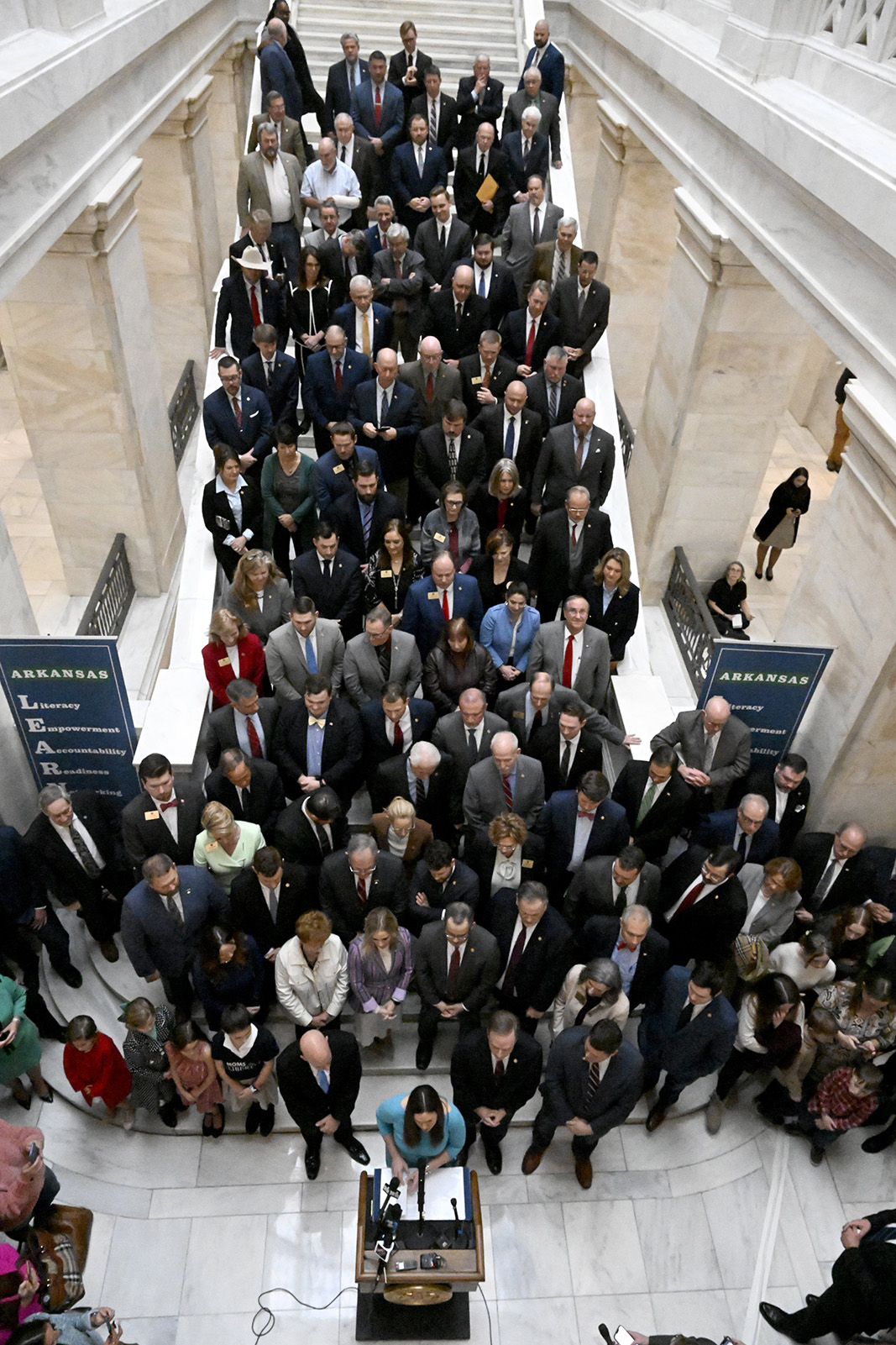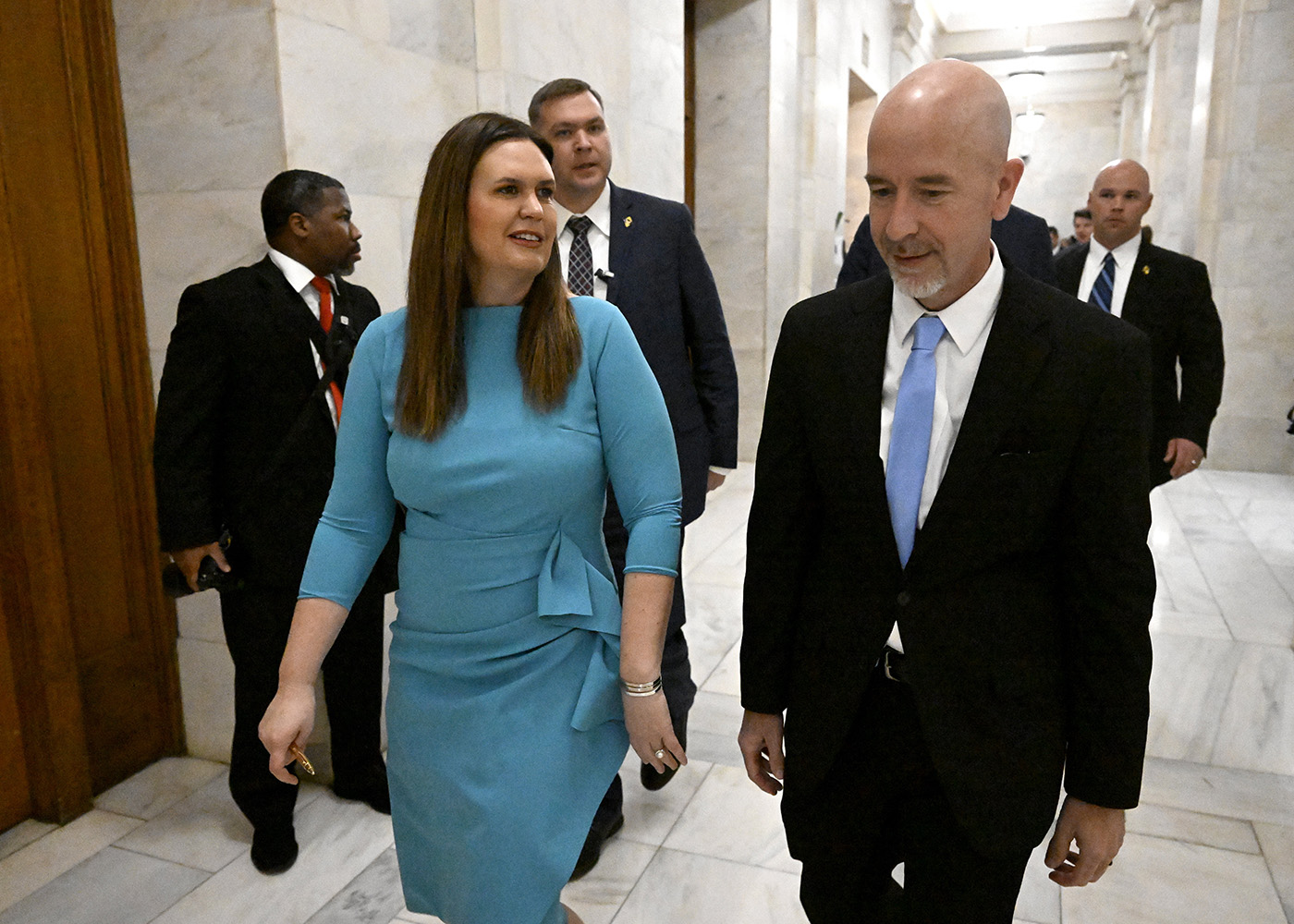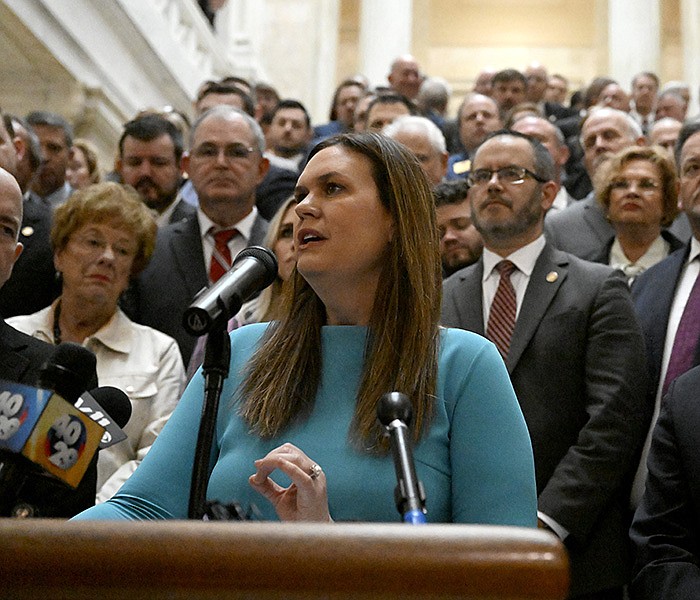Arkansas Gov. Sarah Huckabee Sanders announced on Wednesday plans to increase the state's starting teacher salary by $14,000 and offer vouchers to every student as part of what she described as "the most far-reaching, bold and conservative education reforms anywhere in the entire country."
Speaking in front of a group of GOP lawmakers at the state Capitol, the Republican governor unveiled details of her long-awaited plan to overhaul education within the state.
The proposal includes raising the state's minimum teacher salary from $36,000 to $50,000 a year, and the voucher program would allow students to attend private or home schools. The voucher program, called education freedom accounts, will be phased in over three years, the governor said.
Sanders said her plan also will include funding for reading coaches to improve literacy, bonuses "to our best educators," grants for struggling students to hire tutors and a "dual diploma program" to better prepare students to enter the workforce upon graduation.
She described her plan as a much-needed correction to public education in the state, which lags most states in key categories such as literacy.
"Despite spending half of our state's budget on education, our kids are falling behind," Sanders said. "Only 35% of Arkansas third-graders can read at grade level, and nearly half don't meet our state's math readiness benchmark. This is unacceptable."
The proposal drew praise from Sanders' fellow Republicans, many of whom stood behind her on the steps leading up to the House chamber as she detailed her proposal. Democrats, who said they want to work with Sanders on increasing teacher pay, said they won't support a bill that includes vouchers.
Since taking office a month ago, Sanders has indicated repeatedly that education will be the top priority of her administration. She has spoken at rallies promoting school choice and has signed executive orders aimed at banning "indoctrination" in schools and cutting red tape in the state Department of Education.
The governor outlined her view on education while campaigning through what she dubbed as Arkansas LEARNS, an initiative that she said will serve as the basis for her education overhaul, with an emphasis on literacy, empowering parents, accountability for teachers, career readiness for students, high-speed internet access and improved security at schools.
"This is the most substantial overhaul of our state's education system in Arkansas history, and frankly it couldn't come soon enough," Sanders said Wednesday. "The longer we wait to reform our failing schools, the more future generations we're condemning to a lifetime of poverty."
PAY FOR TEACHERS
Sanders' proposal to raise starting pay for teachers to $50,000 would increase 15,249 teachers' salaries to the new minimum, according to a news release from her office. The proposed increased starting salary is one of several ideas to recruit and retain teachers in the state.
While Sanders has said previously that she supports increasing teacher salaries, Wednesday was the first time the governor gave specifics on what it could look like for the state's educators. She said the increase would move Arkansas from 48th in the nation in starting teacher salaries into the top five.
The governor also proposed forgiving teachers' student loan debt if they commit to working in the areas of highest need within the state, and a $10,000 bonus to educators who are "making meaningful gains in the improvement of student outcomes."
Sanders' proposal also includes 12 weeks of paid maternity leave for teachers and unspecified salary increases for all teachers.
"Like most other states, we're dealing with a teacher shortage," Sanders said. "It doesn't help that Arkansas offers some of the lowest teacher pay in the country. That changes today."
Arkansas ranks ahead of only Montana, Missouri and Colorado in starting salaries for teachers with the national average being $41,770, according to the National Education Association, the nation's largest teachers union. If increased to $50,000, Arkansas would rank only behind Washington, Hawaii, New Jersey and the District of Columbia in starting teacher pay, according to the NEA.
Lawmakers have addressed increasing teacher pay through incremental changes, passing Act 170 in 2019 that gradually increased starting salaries for teachers. For the 2022-2023 school year, the minimum salary for teachers was $36,000. Sanders' plan calls for increasing the minimum to $50,000 for the 2023-2024 school year.
For months, state lawmakers have debated ways to increase salaries for teachers as school districts have found it increasingly harder to fill labor shortages.
In July, then-Gov. Asa Hutchinson called a special legislative session to cut income taxes after state finance officials reported a $1.6 billion budget surplus. Hutchinson considered asking lawmakers to pass a bill to increase teacher pay during the special session in August, but ultimately left it off the session's agenda given the lack of support from fellow Republicans.
While Democrats and some Republican lawmakers wanted to continue the special session to consider teacher pay raises, the Republican-controlled House and Senate voted to adjourn without addressing the issue.
Hutchinson proposed raising starting salaries for educators to $46,000. Senate and House committees later recommended $4,000 raises for all teachers, including increasing the minimum salary to $40,000.
Anticipating Sanders' education proposal, Democrats unveiled plans for their own teacher pay raise bill in late January, also calling for a $50,000 minimum starting salary, a $10,000 raise for every public school teacher, and raising wages for classified staff from $11 an hour to $15.
While Democrats said they want to work with Sanders on raising teacher pay, House Minority Leader Tippi McCullough, D- Little Rock, said the party won't support a bill that includes funding for vouchers.
"Even if there are some things that we'd like to support, that we could support, we just can't do it because we believe the voucher part of it is going to be a systematic dismantling of the public school system in Arkansas," McCullough said.
SCHOOL CHOICE
Sanders' plan would give parents the choice to send their children to public, private, parochial or home school through an education savings account dubbed an "Education Freedom Account."
The education savings account would give parents 90% of what schools are funded on a per-student basis, but the exact details are still being worked out, said Arkansas Education Secretary Jacob Oliva. For the 2022-2023 school year, public schools were funded at $7,413 per student.
"There's some nuances, there's some technicalities that we're still working through," Oliva said.
Sanders said school choice was "the civil rights issue of our day," with her plan for education savings accounts being phased in over three years and with every student in the state being eligible by the 2025-2026 school year.
[GRAPHIC: Check out the pamphlet prepared by Sanders' office » arkansasonline.com/29edu/]
"Families find themselves trapped in failing schools simply because they live in the wrong zip code," Sanders said.
Rep. Brian Evans, chairman of the House Education Committee, said in the first year students in schools rated "F" by the state, children of active duty military, low-income students, those in foster care and students with special needs would be given "the first priority" for school vouchers. In the second year, students who attend "D" rated schools would be phased in, and the third year would be open to every student in the state, Evans said.
The call for education savings accounts is the most controversial part of Sanders' education reform package, with critics arguing it would pull needed funds from struggling schools.
"While there are still many questions left to be answered, it's clear that this aspect of the proposal will be incredibly detrimental to our public school system," said Olivia Gardner, education policy director for Arkansas Advocates for Children and Families. "Our public schools are economic pillars of our communities, especially in rural parts of our state, and we should be focused on doing everything we can to build them up."
Laurie Lee, chair of The Reform Alliance, which partners with the Arkansas Department of Education to administer the Succeed Scholarship, a program that gives students funding to attend private school, praised the proposal.
"Traditional public schools are the backbone of our educational system, but we meet parents and students every day who, for whatever reason, find the school they're assigned to based on their ZIP code simply doesn't work for their child, and they don't have the resources to consider an alternative," Lee said.
With the GOP having super-majorities in the state Legislature, the bill's fate will come down to what Republican lawmakers decide. House Speaker Matthew Shepherd, R-El Dorado and Senate President Pro Tempore Bart Hester, R-Cave Springs, both said they support Sanders' education plan.
"At the end of the day I believe this is something that will receive wide support, and it is something that ultimately makes the difference in countless Arkansans' lives," Shepherd said.
Democrats, who support increasing teacher salaries, have called for separating pay increases from a bill that would include education savings accounts, often referred to as "vouchers."
"I am not sure what it says about the core part of your legislative package that you have to pack it with all these goodies to make it tough to vote against it," said Senate Democratic Leader Greg Leding of Fayetteville. "We still haven't actually seen legislation, so I still want some details. But I really feel like the voucher program is going to put a lot of public schools, particularly in rural communities, at risk."
It might not be just Democrats who are opposed to school choice. Rep. Keith Brooks, R-Little Rock, acknowledged some Republicans have reservations about education savings accounts, with families living in rural communities having few choices of where to send their children.
"It will be a robust debate and members will share their passions and what's important to their constituents, but eventually I'm confident this will get through," said Brooks, who will likely be the House sponsor of Sanders' education bill.
OTHER ASPECTS
The bill will cost $300 million for the first year, with $150 million in new spending, Sanders said.
House Majority Leader Marcus Richmond of Harvey said there was "a general amount of excitement" within his caucus following the unveiling of the LEARNS initiative. While he acknowledged the program would require significant funding, Richmond said the approach was needed to revamp Arkansas' education system.
"I don't think we're any worse off spending it in a bunch right now to try and do a significant shake-up of how we've tried to educate our children," he said. "Go ahead and spend some now, spend more than what we have been spending, because the trickle-down system that we've had hasn't produced any results."
Sanders also announced her proposal will include funding for 120 literacy coaches who will be deployed across the state to help boost the state's literacy rates. Students in kindergarten through third grade who are struggling to read at grade level will be given a $500 grant to hire tutors, Sanders said.
"I like it, because I always say we have go from kindergarten through career, and this starts early to get kids better prepared to be part of that talent pipeline for the future," said Senate Education Committee Chairman Jane English, R-North Little Rock.
"I like the pre-K," she said. "I like more emphasis on literacy, and obviously I like career education, giving people an opportunity to have some skills when they leave high school. That's big in my mind."
The governor's plan also calls for repealing the Teacher Fair Dismissal Act, a law that requires school districts to notify teachers of changes in their employment status before May 1 each year. Critics of the law argue it makes it harder for school districts to hold poor-performing teachers accountable.
Sen. Linda Chesterfield, D-Little Rock, said she is concerned about eliminating the Teacher Fair Dismissal Act because "all it does for teachers and support staff is to give them the same license you have under the Sixth Amendment to know what the charges are, to have representation, to call witnesses for yourself, and question those against you.
"It only requires of administrators that they get off their tails and go into classrooms and actually observe people and be able to give them feedback," she said. "But with this elimination, now there is no incentive for that to happen, and you can go back to the bad old days when I first started that you could just be fired because you were who you were. That's very much a concern of mine."
The proposal also will include funding for crisis response and mental health awareness training for teachers to improve school security, according to a news release from the governor's office. Sanders said the bill will include a provision banning critical race theory or "indoctrination," and a "dual diploma program" that will allow high school students to "choose a pathway" that better prepares them for a career.
Information for this article was contributed by Cynthia Howell, Will Langhorne and Michael R. Wickline of the Arkansas Democrat-Gazette.
CORRECTION: Arkansas’ public schools are funded at $7,413 per student for the 2022-2023 school year, according to a spokesperson for the Arkansas Department of Education. An earlier version of this story incorrectly reported the amount of funding per student.
 People fill the steps outside the House Chamber at the state Capitol on Wednesday as Gov. Sarah Huckabee Sanders unveils her education program. “This is the most substantial overhaul of our state’s education system in Arkansas history, and frankly it couldn’t come soon enough,” she said. (Arkansas Democrat-Gazette/Stephen Swofford)
People fill the steps outside the House Chamber at the state Capitol on Wednesday as Gov. Sarah Huckabee Sanders unveils her education program. “This is the most substantial overhaul of our state’s education system in Arkansas history, and frankly it couldn’t come soon enough,” she said. (Arkansas Democrat-Gazette/Stephen Swofford) Gov. Sarah Huckabee Sanders walks to her office alongside Education Secretary Jacob Oliva on Wednesday after outlining her education plan. “There’s some nuances, there’s some technicalities that we’re still working through,” Oliva said at the announcement. (Arkansas Democrat-Gazette/Stephen Swofford)
Gov. Sarah Huckabee Sanders walks to her office alongside Education Secretary Jacob Oliva on Wednesday after outlining her education plan. “There’s some nuances, there’s some technicalities that we’re still working through,” Oliva said at the announcement. (Arkansas Democrat-Gazette/Stephen Swofford)